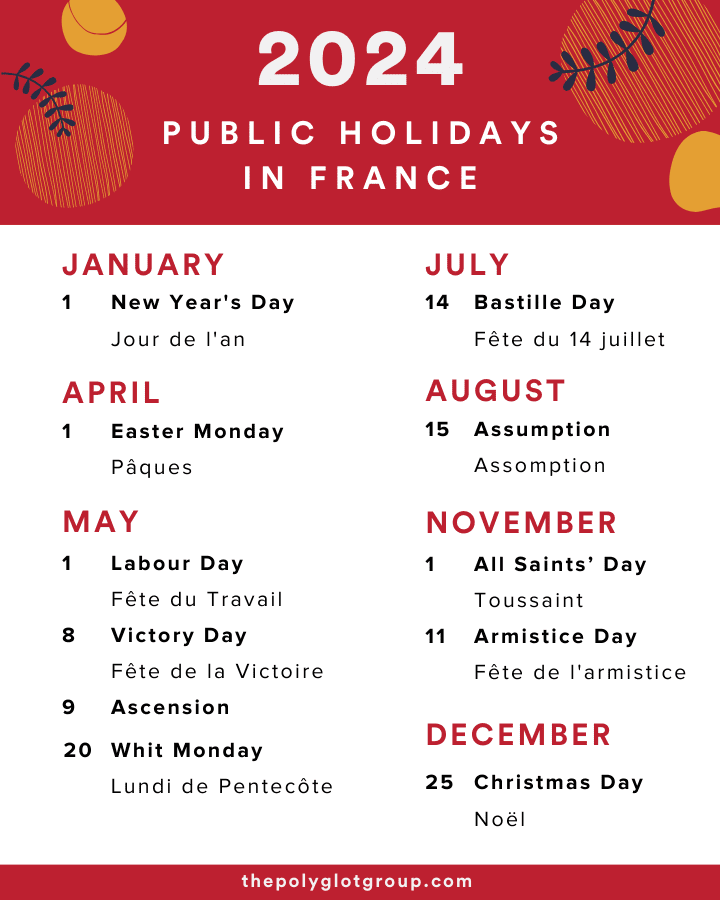France observes and celebrates many holidays throughout the year, whether religious holidays, seasonal holidays, or national holidays relevant to the history of France.
Should your foreign business have a presence in France, or you’re interested in learning more about French culture it is important to keep on top of all public holidays from an HR compliance perspective. For ease, we’ve summarised all public holidays that are observed throughout the country in 2024.

January
1 January | Monday | New Year’s Day | Jour de l’an
The night preceding New Year’s Day (New Year’s Eve) traditionally consists of a dinner party with friends, known as le reveillon. Everyone is sure to pop a bottle of champagne at midnight.
April
1 April | Monday | Easter Monday | Pâques
Although secularism is increasingly more prominent in France, Catholic holidays continue to hold great significance. The Easter weekend is a family holiday that falls during the school holidays.
It is generally a time for chocolate with Easter egg hunts and family lunches, complete with roast lamb.
Note: Good Friday (29 March) is observed in Alsace and Moselle only.
May
1 May | Wednesday | Labour Day | Fête du Travail
Also known as May Day, the first day of May is a legally required paid holiday for all French employees.
Traditionally a day on which trade unions stage labour protests in large cities, it is also called la fête du muguet (Lily-of-the-Valley Day), when it is customary to exchange these flowers for good luck.
It is a day to celebrate French workers and their contributions to society.
8 May | Wednesday | Victory Day | Fête de la Victoire
Celebration and remembrance of the end of World War II. This marks the day when Germany surrendered to the allied forces. Military parades are on show throughout the day.
9 May | Thursday | Ascension | Ascension
The date changes from year to year as it depends on when Easter occurs. Ascension Day is celebrated each year on a Thursday, 40 days after Easter Sunday.
20 May | Monday | Whit Monday | Lundi de Pentecôte
As with other Easter-related holidays, this date changes from year to year. Known as Whit Monday, the holiday falls on the Monday following the 7th Sunday after Easter Sunday.
Since 2005, Whit Monday was removed from the public holiday list and changed to Solidarity Day.
Workers are not paid and the money is used to help the elderly and disabled.
In 2008, Whit Monday was reinstated in the Public Holiday list and allows the companies to choose any date for Solidarity Day.
July
14 July | Sunday | French National Day / Bastille Day | Fête du 14 juillet
This day is the French National Day that commemorates the French revolution. The commemoration is celebrated with an enormous military parade along the world-famous Champs-Élysées avenue in Paris. A perfect summer day for a picnic and a game of pétanque.
August
15 August | Thursday | Assumption of the Blessed Virgin Mary | Assomption (or Le 15 août)
This public holiday falls in the middle of August, when it is peak holiday season and many locals will be away from work. Thus, not much work is expected to occur around this date.
November
1 November | Friday | All Saints’ Day | Toussaint
It is a day when people traditionally visit the graves of their ancestors. They take the opportunity to leave chrysanthemums on the graves, the typical flower for this day.
11 November | Monday | Armistice Day | Fête de l’armistice
Armistice Day is a day to commemorate the peace treaty (armistice) signed at the end of World War I.
December
25 December | Wednesday | Christmas Day | Noël
On the days leading up to Christmas, children leave their shoes out to be filled with gifts from Père Noël (sometimes known as Papa Noël, or Father Christmas in English). These gifts may include confectionery or toys.
Both at home and in the workplace, Christmas decorations are common, particularly the sapin de Noël – the Christmas tree – with fruit, ribbons and toys hung from them.
Many homes and churches will also display a crèche filled with santons, or Nativity scene. Christmas in France is a special time of worship, generosity, family reunions and acts of charity.
Each country celebrates its own distinct holidays, which not only affect business but also their culture. These celebrations, in fact, are a colourful demonstration of a nation’s cultural values and customs. Understanding and observing cross-cultural differences is one of the key aspects of intercultural communication and awareness.













 January 5, 2024
January 5, 2024 








